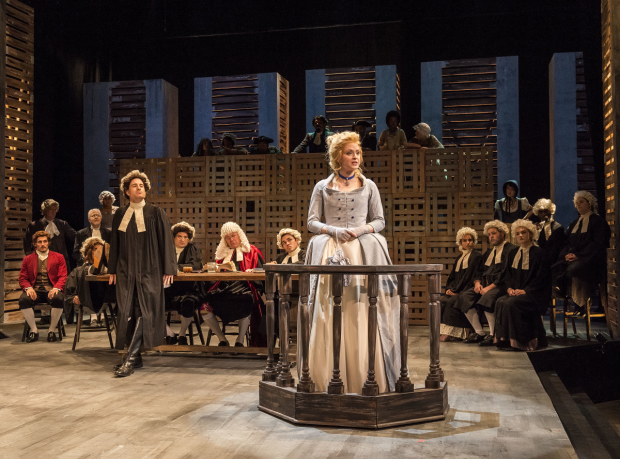A Tale of Two Cities

(© Craig Schwartz)
A solid cast enlivens Charles Dickens's epic A Tale of Two Cities at A Noise Within, which is tautly directed by Geoff Elliott and Julia Rodriguez-Elliott, who drive home comparisons between the bedlam in 18th-century Europe and the current political climate.
As England wages war against the 13 American colonies in 1780, a conflicted aristocrat, Charles Darnay (Tavis Doucette), has been falsely arrested for treason. Though the prosecution believes they have an airtight case, a barrister named Sydney Carton (Frederick Stuart) rips apart that case when a witness admits she may have actually seen Carton, a doppelgänger for Darnay, instead of the accused and cannot be sure. Now a free man, Darnay falls in love with one of the witnesses in his trial, Lucie Manette (Emily Goss), whom he met while showing kindness to her infirm father (Nicholas Hormann). As Darnay and Lucie get married, revolution breaks out in neighboring France. Circumstances force the family back to Paris even though that puts these French-born nobles, particularly Darnay, in mortal danger. Another trial has commenced in Paris for Darnay, but this time vengeance, not justice, is the order of the day.
Condensing a vast novel like A Tale of Two Cities is a gargantuan task. Mike Poulton's version, which toured Europe and has now arrived in the United States, features the bare-bones plot boiled down to a melodrama in which the French Revolution becomes a backdrop, and one of literature's greatest heroes, Sydney Carton, a supporting player. Many important events seem like they're taking place just out of view offstage. Suffering most is the characterization of the villainess Madame Defarge (Abby Craden). Utterly gripping in the novel, her character here is instead sketched as a rabid dog without subtleties, no different from a crazed vengeance demon in a pulp novel. The mechanics of Poulton's script, though, are strong. He draws comparisons between the supposedly civilized court of England, where false testimony and innuendo almost put an innocent man to death, and the kangaroo court of revolutionaries, who allow for no pretense of facts and bloodthirstily decapitate even innocent children.
Stuart stands out as Carton, a disheveled, aimless man desperate to find meaning in his life. Doucette has the more thankless role of Darnay, someone upon whom tragedies rain, but other than traveling to Paris to protect a servant, he is performed as a mostly passive character. Unfortunately, the actors playing twins Carton and Darnay do not do much of a job of carrying themselves in any attempt to resemble each other physically or gesturally, which is especially frustrating when two plots hinge on Carton being mistaken for Darnay. Hormann brings nobility to the doctor, who believes his past anguish will endear him to the mad mob, only to discover the collective cares about no one. Though her part doesn't have the depth it requires, Craden is menacing as a power-hungry revolutionary. As her conflicted husband, Kasey Mahaffy adds mystery to his motivations. As the mother-hen servant Miss Pross, Trisha Miller lends humor and humanity to a woman who protects her charges without fear. Goss is appropriately demure as the aristocratic girl caught in the chaos.
Directors Elliott and Rodriguez-Elliott lift the veil of history and clearly demonstrate how humans repeat the same mistakes over and over. In both Darnay's British and French trials, witnesses shout out their patriotism with no regard for the truth. Characters remark that if slaughtering blameless people is for the good of the republic, then so be it. Set designer Fred Kinney and projection designer Kristin Campbell turn a stack of grids into cities and transportation to give the small stage heft. Composer Robert Oriol borrows motifs from French music and hints enough at Les Misérables's splendor without stealing any of the elements. Costume designer Jenny Foldenauer juxtaposes the overindulgent dresses of the aristocracy with the rags of the newly empowered citizens of Paris.
A tale this massive may require a longer text to capture all the nuances and suck the audience into this grotesque era. At two-and-a-quarter hours, the play doesn't have time to breathe. Regardless, A Noise Within soldiers on with A Tale of Two Cities, forging a diligent production that condemns mob mentality.











